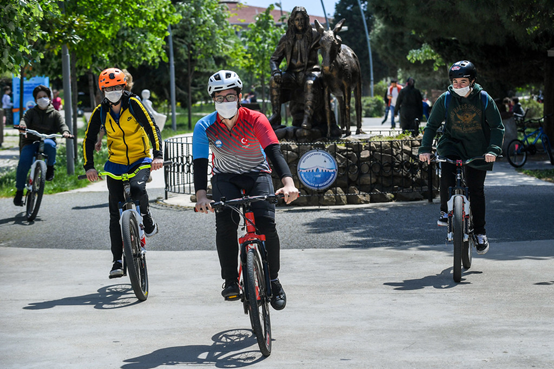The World Health Organization said on Wednesday that on June 3, World Cycling Day highlights the potential to change the way the world travels before and after the COVID-19 pandemic and will help create a healthier and more sustainable future.

The United Nations General Assembly passed a resolution in 2018, proclaiming June 3 as “World Cycling Day”, which aims to encourage stakeholders to emphasize and promote the use of bicycles as a means to promote sustainable development, strengthen the education of children and young people, and promote health, disease prevention, promotion of tolerance and mutual understanding and mutual respect, promotion of social tolerance and a culture of peace. The General Assembly welcomes the organization of cycling activities at the national and regional levels to enhance physical and mental health and create a cycling culture in society.
In his speech on “World Cycling Day”, UN General Assembly President Bandy said: “This year… we recognize the uniqueness, versatility, and characteristics of bicycles that contribute to longevity.” He also pointed out that in the richest countries, The use of bicycles is increasing in developing and least developed countries.
The new crown crisis has cut off commuting and travel and has plunged leisure sports around the world into a deep “freeze” state. However, cycling has not only proven to be immune to the pandemic to a large extent, but it also seems to be becoming more popular in many cities, including New York, where the United Nations is headquartered.
The World Health Organization recommends that cycling is not only a way of travel but also a way to stay healthy during and after the global COVID-19 crisis.
Bandy said: “There is evidence that even before the COVID-19 pandemic, many people used bicycles as an affordable and fair mode of transportation, which led to longer and healthier lives. Cycling is not only proven. It can improve physical health and has a positive impact on mental health and subjective well-being.”

Diversified advantages
The benefits of bicycles are manifold.
Bandy pointed out that in many countries, owning bicycles has a great impact on families, helping them to escape poverty. At the same time, when public transportation is unavailable, they have more opportunities to access high-quality education, jobs, markets, and community activity.
As many governments continue to explore how to relax the blockade, provide recreational opportunities for urban residents, and fill the gaps left by limited public transportation, the penetration rate of bicycles has also increased sharply, while at the same time allowing people to maintain physical distance and prevent Spread of the virus.
As a reliable, clean, and environmentally friendly mode of transportation, bicycles are also considered to be a key component of the “green recovery” after the new crown pandemic.
Bandy said: “Safe, efficient, low-carbon and affordable travel for all is essential to achieving the Sustainable Development Goals.”
Cycling not only contributes to a healthy, livable city by reducing pollution, but it also keeps people physically active.
He pointed out: “In the COVID-19 era, cities are facing the challenge of rethinking their infrastructure. Bicycles play a vital role in providing a quiet, economical, and pollution-free alternative to cars and public transportation systems. effect.”
Rethinking infrastructure
On the occasion of “World Cycling Day”, the United Nations encourages governments to improve road safety and better incorporate the needs of cyclists into the design of transportation infrastructure.
Millions of people around the world use bicycles as their primary means of transportation, so their needs must be better integrated into policies and transportation infrastructure investments.
The United Nations Environment Programme stated that “measures to protect pedestrians and cyclists are a key part of building the urban space of tomorrow”.
In response to the new coronavirus pandemic, many European and American cities, including London, New York, Paris, Berlin, Milan, and Bogota, have proposed plans to release street space usually dominated by cars for the exclusive use of cyclists and pedestrians, at least It is implemented at certain times of the week.
UNEP is supporting the “Shared Road Program”, which aims to shift from prioritizing infrastructure for the few who drive to the majority of people who walk and ride bicycles.
UN General Assembly President Bandy said: “Investing in urban infrastructure to support cycling, including protection of bike lanes and shared bikes, will create a safer, more resilient, and sustainable future for all of us.”
“World Cycling Day” is not only a celebration of zero-emission travel and connectivity tools but also an opportunity to unite everyone to maximize the potential of cycling and its impact on human health and the environment.

